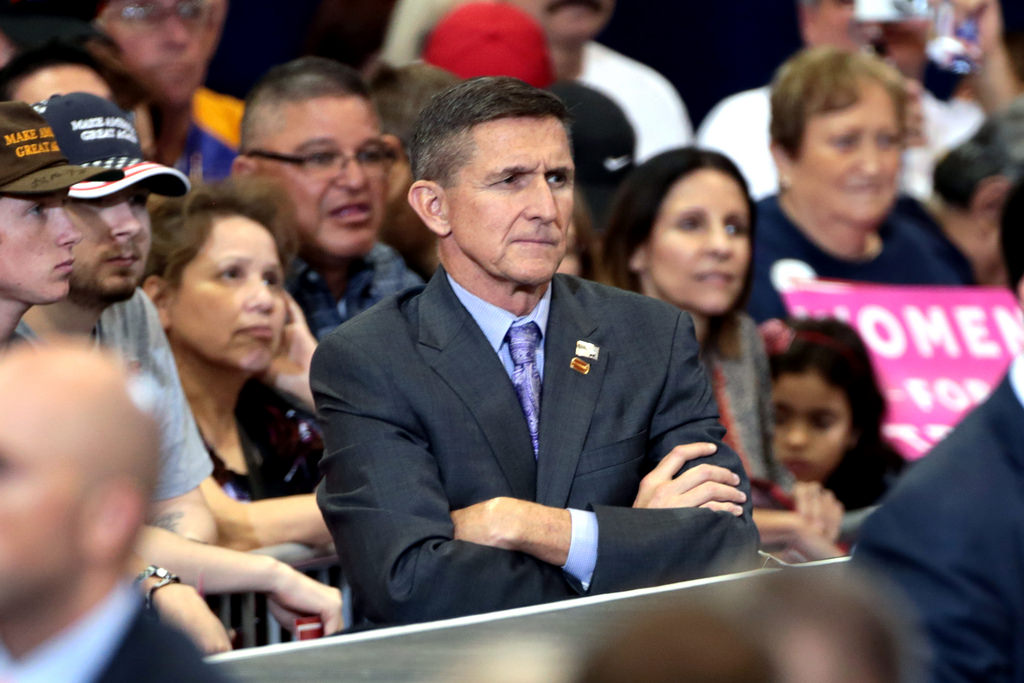by Robert E. Hunter
National Security Advisor Michael Flynn resigned yesterday from his position in the Trump administration. Reportedly, he spoke with the Russian ambassador to the United States about sanctions on Russia before the national security advisor had taken office and was thus legally entitled to conduct such a conversation. Worse, he was less than candid about the conversation to Vice President Mike Pence, thus putting the latter in the position of lying on the Sunday talk shows. As we said about President Nixon and Watergate, “The cover-up was worse that the crime,” so Flynn had to go. As the White House spokesman put it, “The issue, pure and simple, came down to a matter of trust.”
Flynn’s resignation is an example of Hunter’s Law. With each new administration, the loyal opposition, in both Congress and the media, tries to find at least one senior-level presidential appointee who can be rejected for cause, however minor, to keep the new president on his toes. In the Clinton administration, two highly-qualified nominees for attorney general had to go when it was revealed they had employed illegal immigrants as household employees.
General Flynn thus became “it” for the Trump administration.
Russian Concerns
But there were other reasons for the president’s letting him go beyond the matter of “trust.” Foremost is the sensitivity of the issue he discussed with the Russian ambassador. Throughout last year’s presidential campaign, Trump created a major stir in the American foreign policy community by questioning US policy toward Russia in the wake of its seizure of Crimea, aggression in other parts of Ukraine, and perceived threats to NATO members in Central Europe. He even praised Russian President Vladimir Putin and prompted the media to talk of a “bromance” between the two men. Further, there are continuing questions about Russia’s role in the US presidential campaign, amplified by some Hillary Clinton supporters’ bitterness at the results.
What this history presages for US policy toward Moscow in the Trump administration is still anyone’s guess. But the flexibility in US politics that the new president clearly seeks in dealing with Russia, long overdue in this writer’s judgment, has certainly not been aided by General Flynn’s indiscretion and the overheated reaction to it.
With the Russia issue hanging politically over Flynn’s head, his value to the president was compromised. Even if he’d survived the media frenzy, it would for a time distract from other messages Trump is seeking to send (or tweet). Also important is what Flynn’s departure could mean for another critical aspect of US foreign policy: the administration’s approach to the Islamic world and especially the Middle East. Flynn has a long history of extremist views on Islam, going well beyond Islamist terrorism, that permeate a book he co-authored last year: We Can Win the Global War Against Radical Islam and Its Allies.
Turbulence within the National Security Council comes at a difficult time for US Middle East policies. The new and untried administration has had no breathing space, in major part because of its frenetic, Trump-driven pace. Most contentious has been the imbroglio over the president’s highly controversial executive order temporarily banning travel to the United States by anyone from seven Muslim countries. The blowback both within the US and from around the world has complicated policymaking toward the Middle East and made it more difficult for Trump and his team to show that they can differentiate between Islam (no problem) and Islamist terrorism (to be opposed with all means necessary.)
Unfortunately for a new president who needs the best, unbiased advice he can get, even with Flynn’s departure he is still surrounded by hardliners on Islam, including a newly appointed deputy assistant to the president, Sebastian Gorka, who brings his own deeply biased perspective. Much more important is the chief strategist, Steve Bannon, who has called Islam “the most radical religion in the world’ and warned that members of the faith created “a fifth column here in the United States.”
Of course, Trump could (mistakenly) appoint a successor to Flynn with views just as extreme or who would have other liabilities. Nevertheless, the change of command at the National Security Council increases the chances that President Trump will gain a wider range of views on the Middle East and all its tribulations than would have been true if General Flynn had remained.
What Trump Needs
Trump needs to appoint someone with serious knowledge and experience across the full range of foreign policy and national security issues, preferably whose experience has not been limited to military matters. The challenges the US faces in the world go far beyond that realm. The National Security Council structure needs someone with a broad perspective, who understands the complex nature of both threats and opportunities, and who can integrate diplomatic, political, and economic tools, as well as military ones.
Any president in today’s world must also have close to hand someone with a capacity to provide strategic analysis and policy options at the highest level, to relate “apples to oranges” across regions and functions, to calculate trade-offs, and to set priorities. This person must also bring no ideological baggage, a quality required in a national security advisor if he or she is to recruit and retain an able staff, earn the trust of the rest of the bureaucracy, and give the president advice that truly serves the national interests.
Such people exist in the United States, most of them with skills developed in career paths primarily out of uniform. Unfortunately, new presidents without prior serious engagement in foreign policy and national security tend to get this wrong, at least at the start. This was true of the last three US presidents, none of whom surrounded himself with top officials able to do the highest-level strategic thinking that is a sine qua non for effective policy and action. The United States cannot afford a fourth administration in a row without a top official at the president’s right hand who has the necessary skills, who can invigorate the bureaucracy to do its best, and who both recognizes the “best” and ensures that the president has the benefit of broad-ranging and unbiased advice that he must have to do his job. Flynn was not that person.
President Trump obviously would have preferred not to have had this crisis of confidence in his administration. But it has provided him with a chance to conduct a shake-out in personnel and process before any real damage has been done to US foreign policy—unlike, say, President John Kennedy’s being blindsided into the Bay of Pigs fiasco only a few months into his administration.
President Trump can reboot the way foreign policy and national security business is done in the White House. If he wisely makes the right choice this time in selecting new national security advisor, then that one small slip in one phone call will have made a major contribution to the nation.
Photo of Michael Flynn courtesy of Gage Skidmore via Flickr.





